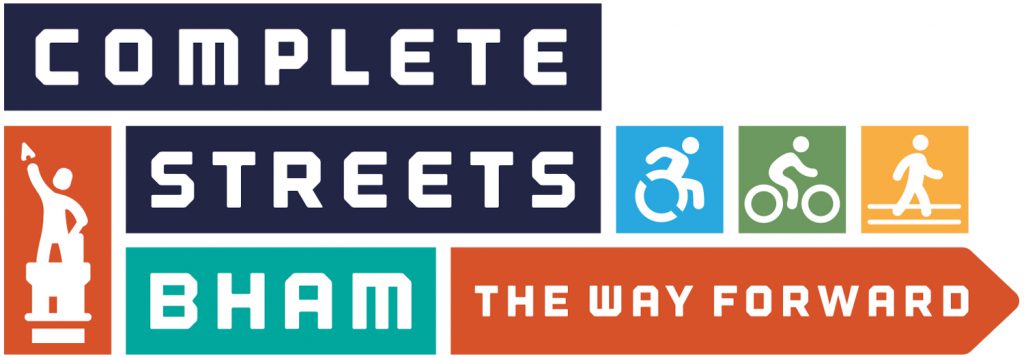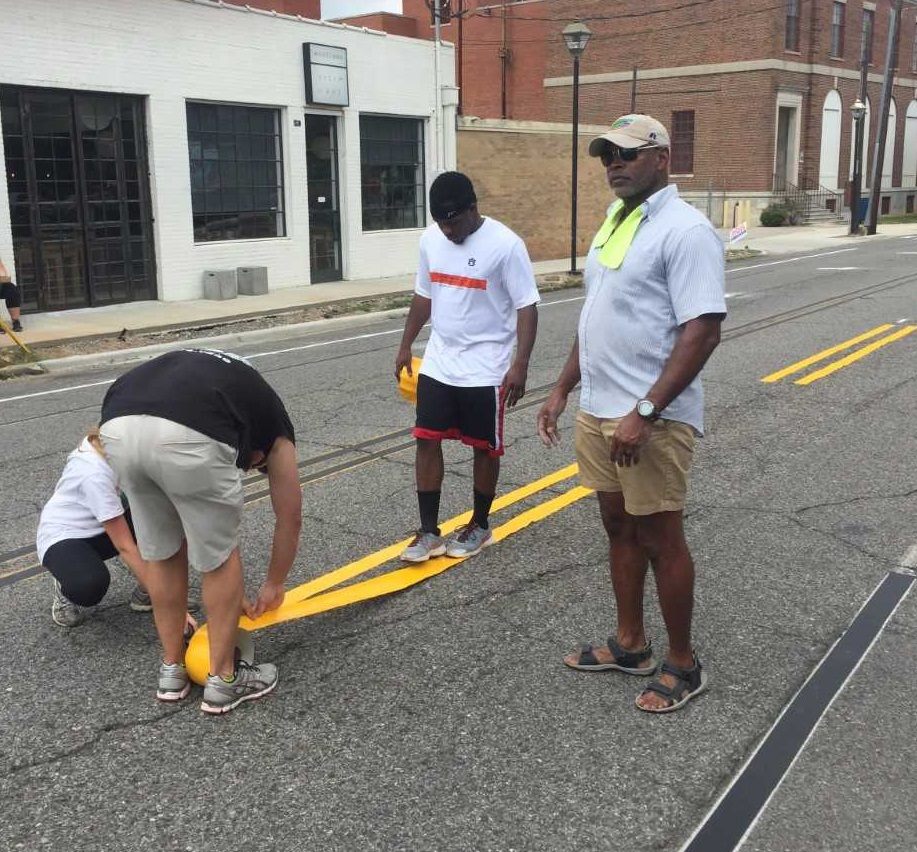
The Birmingham City Council Committee of the Whole recently introduced a draft of a Complete Streets Ordinance, a significant step forward in the ongoing advocating of a balanced transportation initiative in the City of Birmingham.
Complete Streets is an initiative led by a growing number of organizations and individuals who would like to create a network throughout Birmingham of streets that are safe and comfortable for everyone – whether they are walking, riding the bus, using a wheelchair, cycling or driving.
The new Complete Street Ordinance would require the City of Birmingham to consider all modes of transportation when roadway projects are being completed within the city. This means that instead of just designing a street to accommodate cars, street projects will be evaluated for the possible addition of sidewalks, crosswalks, bus stops and bike lanes.
One such project already on the horizon is in Woodlawn. The city has committed a budget to reconstructing about five blocks of 1st Avenue South in the community’s core. To raise awareness and gain community input for the street design, REV’s Catalytic Development team conducted a tactical urbanism project last fall.

Tactical urbanism projects are community-led with the purpose of reflecting what a specific change in the community would look like, with hopes of the change becoming permanent. In this case, Complete Streets advocates were able to demonstrate how a Complete Streets design could work in Woodlawn.
In September 2017, a team of volunteers including some REV staff focused their efforts on two Woodlawn blocks, reducing the travel lanes from two to one in each direction. The group created temporary bike lanes, crosswalks and parallel parking with traffic tape to allow the community a preview of how Complete Streets would impact the area.
To create Complete Streets, public officials must balance competing demands for funding and for space. Each street project will have a unique set of circumstances and opportunities, so they cannot all be the same. However, making a commitment to Complete Streets means ensuring that every new roadway project will balance all these factors to create the safest, most accessible roadways possible.
If the ordinance is adopted, Birmingham will join more than 1,000 other communities nationally in formally recognizing the importance of Complete Streets. According to WBRC news the Birmingham City Council will hold a public hearing on March 6 to discuss the Complete Streets Ordinance. The policy will likely come up for a formal vote at one of the council’s Tuesday meetings in late February or in early March.
Roadways that are safe and accessible to everyone are critical to building a vibrant community. If you are in support of the Birmingham City Council adopting the Complete Streets Ordinance, sign the petition here.
Related News
-
The Key Tool for Urban Revitalization: Downtown BHM's Business Improvement District
Filed Under: Business-Proving, Developer, Downtown Birmingham, Front Page, Get Involved, Potential-Proving, Why BHM
By the time REV took on BID management in 2018, downtown had a new set of needs from its BID. Downtown Birmingham in the ‘90s had a population mainly of 9 to 5 employees. But the downtown of 2018 had a whole new population of residents and visitors throughout the day and night. We had new opportunities to create positive experiences, inviting them into more downtown businesses and public spaces, and to keep them coming back for more.
-
Introducing the six businesses that call Nextec home
Filed Under: Business-Proving, Developer, Downtown Birmingham, Filling Vacant Spaces, Front Page, Historic Preservation, Potential-Proving, Why BHM
On the corner of 3rd Avenue and 16th Street North, you’ll find Nextec, a redevelopment of the 90-year-old, 65,000-square-foot Edwards Motor Company building (also formerly known as the Sticks ‘N’ Stuff building). With experience in historic renovation, developer Michael Mouron, chairman of Capstone Real Estate Investments, began this civic project in 2021 as a space for business startups to continue their work in the Magic City – a function encouraged by REV Birmingham.
-
Urban Vintage Clothing pedaling forward
Filed Under: Business-Proving, Downtown Birmingham, Front Page, Potential-Proving, Small Business, Why BHM
For as long as he can remember, Ty King, owner of Urban Vintage Clothing, has had an inclination for fashion. To him, style is more than the clothes on your back. It’s a feeling – and a really good one, if you’re intentional about expressing yourself through your attire.
That passion, combined with an unwavering entrepreneurial spirit, is what drove him to open his storefront for Urban Vintage Clothing in December of 2022.